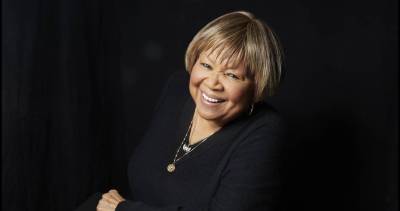Shameless disability
Days before her first film premiere in more than 20 years, Bonnie Sherr Klein was determined to create a cake from scratch for her granddaughter's birthday. Unlike her former life as an iconic feminist and filmmaker, this is the kind of thing she's been up to for the past two decades. Using two canes for support, she edged her way around her False Creek apartment. Before stepping out for ingredients, she applied lipstick, found the dog's leash, donned a floppy yellow rain poncho, and grabbed her purse. By the time she was seated on Gladys, her motorized scooter, almost 15 minutes had passed.
Thanks to accommodation by the National Film Board, the fast-paced world of filmmaking has slowed down for Klein, 65, the former queen of Canadian documentary. After a massive stroke 19 years ago, the radical director of Not a Love Story: A Film About Pornography and Speaking Our Peace partially lost arm and leg movement and sustained some brain damage. She fatigues easily, has memory problems, gets flustered when there's too much activity, and can't move easily.
She's not embarrassed by it. She just takes her time.
“I lived our worst nightmare, and it's not a tragedy,” she tells the Georgia Straight in a recent interview at her apartment, noting that she keeps her schedule far lighter as a recluse than she did during her days in the spotlight. “I'm still fun and political.”
Klein's first film since her stroke, Shameless: The ART of Disability, kicks off the DOXA Documentary Film and Video Festival on May 23. (See sidebar.) The film centres on a “pyjama party” at her Roberts Creek cottage, where five disabled artists, Klein included, chat and laugh about the sometimes dark relationship between creativity and incapacity. The film opens with a roundtable on the film's potential title. Not a Crip Story was the stars' favourite.
Klein's costars include comedian David Roche, who looks, he says in the film, like Quasimodo due to a facial deformity that resulted from childhood treatments for a tumour. His one-man show is called The Church of 80 Percent Sincerity, a tongue-in-cheek performance poking fun at “recovering perfectionists”. Visual artist Persimmon Blackbridge, whose arms are streaked with self-inflicted razor scars, notes in the film that her mental disability becomes invisible if she wears a long-sleeved shirt. She can seem “normal”, both a benefit and a tragedy, as she explains in the film. Dancer and quadriplegic Geoff McMurchy organizes Vancouver's annual KickstART festival, an event that highlights visual and performing arts by disabled creators. And Catherine Frazee, a University of Toronto professor and poet, stars in the film's only love scene, which includes a medical hoist. She describes herself as a fugitive from Canada's laws. Two years after she was born, the prenatal test, amniocentesis, became widespread in Canada. Had her parents found out she had spinal muscular atrophy, she might have been aborted.
Klein adores her costars. “In a way they're extraordinary; in a way they're very ordinary,” she explained over tea. “Everyone is dealing with the hand they're dealt. Living with disability is itself an art. You're forced to innovate. There's no script, and you're forced to go around obstacles. It forces a kind of creativity.”
Unlike the film's other artists, Klein came to disability late in life, at 46. Thus she can be a bridge between her able-bodied audience and her disabled costars. Earlier in life, she too had full use of her legs and brain. She hopes her on-screen vulnerability helps the audience reflect on what they would do if disability happened to them.
When looking at the fate of other similarly disabled people, Klein considers herself lucky. Her doctor-husband guided her though the medical system as an insider, and helped her recover at home. Plus, she's always had money and brains. For the past 19 years, Klein has been known as the matriarch of Canada's left: married to groundbreaking pro-nature obstetrician Michael Klein; mother of No Logo author Naomi Klein, and of Seth Klein, the B.C. director of the Canadian Centre for Policy Alternatives; mother-in-law to Avi Lewis, filmmaker, journalist, and son of Stephen Lewis, United Nations special envoy for AIDS in Africa; and mother-in-law to CBC News: Marketplace journalist Erica Johnson. Now, she's back in the spotlight.
“It's very levelling,” she said of her experience becoming disabled. “I did have a privileged and blessed existence [before the stroke]. I was empathetic and a lot of my work was about trying to bring people with less privilege to a better quality of life. I think, though, there was still this middle-class guilt. There was a feeling of not being there.”
If she could turn back the clock and avoid the stroke, she's not sure she would. However, she pointed out, she doesn't have a monopoly on these insights; wait long enough, and everyone becomes disabled.
The documentary has another important bridge, and the clue is in the title: Shameless. If physically flawless Brangelinas are on one end of the movie-star scale, Klein's friends are at the far reaches of the other. Yet they're more fabulous. Roche, in a scene that was cut, points out to his standup audience that everyone in the room is disabled””it's just that most of them aren't wearing their disability on their face, as he does. Indeed, the film as a whole indirectly asks all of its viewers, disabled and able-bodied, What are you ashamed of? How are you confronting it?
Unlike the National Film Board's 83 other films that explain disability, Klein's is the only one made by a disabled person, Klein said. In fact, she pointed out that no “disability” film she's aware of was made by a disabled person. Even Murderball (2005), with its “screw pity” theme, was clearly made by an able-bodied filmmaker, she said. So Shameless, to Klein, is a pioneering venture.
The artists in the film are not typical of most Canadians with disabilities, Klein admitted: they're in long-term relationships, relatively well-off financially, self-expressive. However, Klein hopes the audience will imagine a world in which all people with disabilities have those same opportunities.
“Dave [Roche] said there's two ways to create change: violence and imagination,” remembered Klein. “I think that's gorgeous. If people can imagine a more inclusive world, that would have repercussions for everyone.”
Klein, more subtle than she was 20 years ago, describes this film as “gently subversive”. It challenges stereotypes about sex, art, ability, shame, and friendship, but doesn't hit the audience with them like a brick as she said she used to do. Unlike the political fervours of her early adulthood, this film doesn't exist in a vacuum, as she well knows; it gently lights the way for many more disabled filmmakers to tell their stories. They're coming, she believes.















Comments